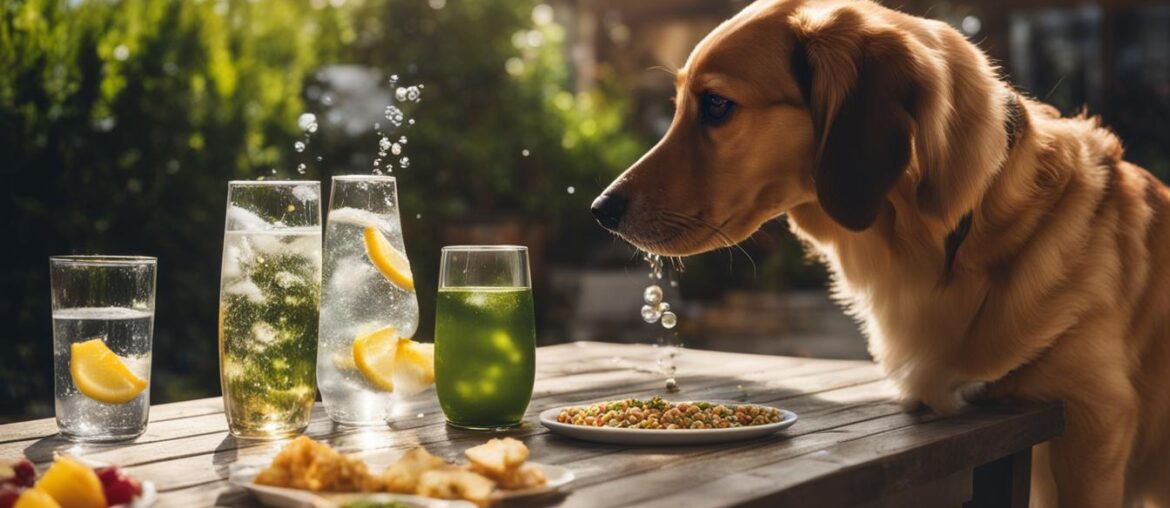As a dog owner, you want to provide the best care for your furry friend, including their hydration needs. However, when it comes to sparkling water, it’s important to consider whether it is safe for dogs to consume. In this article, we will explore the potential risks and benefits of sparkling water for dogs, and provide expert insights to help you make an informed decision.
Key Takeaways:
- Sparkling water is not recommended for dogs as it can cause gas buildup and potentially lead to bloat, a life-threatening condition.
- Some sparkling water brands may contain xylitol, a sweetener that is toxic to dogs and can cause liver disease.
- Dogs have unique digestive systems and may not tolerate carbonation well, resulting in discomfort and digestive upset.
- Flavored sparkling water should be completely avoided as it may contain harmful additives and artificial sweeteners that can be toxic to dogs.
- Stick to plain, fresh water for your dog’s hydration needs and consult with your veterinarian for any concerns or questions.
The Effects of Sparkling Water on Dogs’ Digestive System
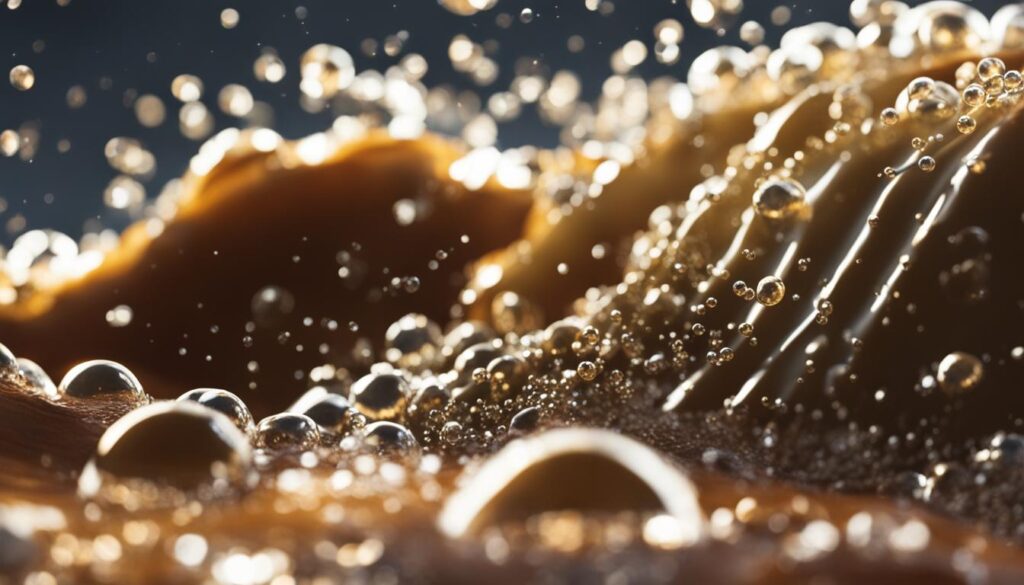
Dogs have a unique digestive system specifically designed for processing meat and bones. When it comes to sparkling water, the carbonation can have adverse effects on dogs’ digestion and overall well-being. It’s important to understand these effects to ensure the health and happiness of your furry friend.
Bloating and Discomfort
The carbonation in sparkling water can cause bloating and discomfort in dogs. The bubbles can lead to gas buildup in their digestive system, resulting in a distended abdomen and discomfort. This can lead to decreased appetite and digestive upset in dogs.
“The carbonation in sparkling water can cause bloating and discomfort in dogs.”
Risk of Bloat
One of the major concerns with carbonated water for dogs is the risk of bloat, also known as gastric dilatation-volvulus (GDV). Bloat is a life-threatening condition in which the stomach becomes distended and can twist, cutting off blood supply to vital organs. Large and giant breeds are particularly susceptible to bloat, and the carbonation in sparkling water can contribute to this risk.
“The carbonation in sparkling water can contribute to the risk of bloat, especially in larger breeds.”
Alternative Beverages for Dogs
Instead of giving dogs carbonated water, it’s best to provide them with plain water as a primary source of hydration. Plain water is safe and essential for dogs’ overall health. However, if you’re looking for alternative beverages to offer your dog, there are a few options worth considering:
- Pedialyte: This electrolyte solution can help replenish fluids and provide hydration, especially in situations where dogs may have lost electrolytes.
- Coconut water: Natural coconut water can be a refreshing and hydrating option for dogs. Just make sure it doesn’t contain any added sugars or artificial sweeteners.
- Broth: Low-sodium chicken or beef broth can be a tasty and hydrating option for dogs. It can also be a great way to add moisture to their meals. However, avoid using broth with added seasonings or spices that could be harmful to dogs.
Remember, when introducing any alternative beverages to your dog’s diet, it’s essential to consult with your veterinarian to ensure they are safe and suitable for your dog’s specific needs.
Providing your dog with proper hydration is crucial for their overall well-being. While dogs may be naturally curious about carbonated water, it’s best to avoid giving it to them due to the potential negative effects it can have on their digestive system. Stick to plain water as the main source of hydration, and if you’re looking for variety, consider safe alternative beverages like Pedialyte, coconut water, or broth. Remember, prioritizing your dog’s health and consulting with a veterinarian will ensure they stay happy and hydrated.
The Risks of Giving Dogs Flavored Sparkling Water
Flavored sparkling water should be completely avoided for dogs. These drinks often contain additives, artificial sweeteners, and flavors that can be harmful to dogs.
Xylitol, a common sweetener used in sugar-free products, is highly toxic to dogs and can cause low blood sugar and liver disease.
Some flavored sparkling water may also contain caffeine or other stimulants that can be toxic to dogs, causing restlessness, tremors, and seizures.
It is best to stick to plain, unflavored water for your dog’s hydration needs.
Veterinary Insights on Sparkling Water for Dogs
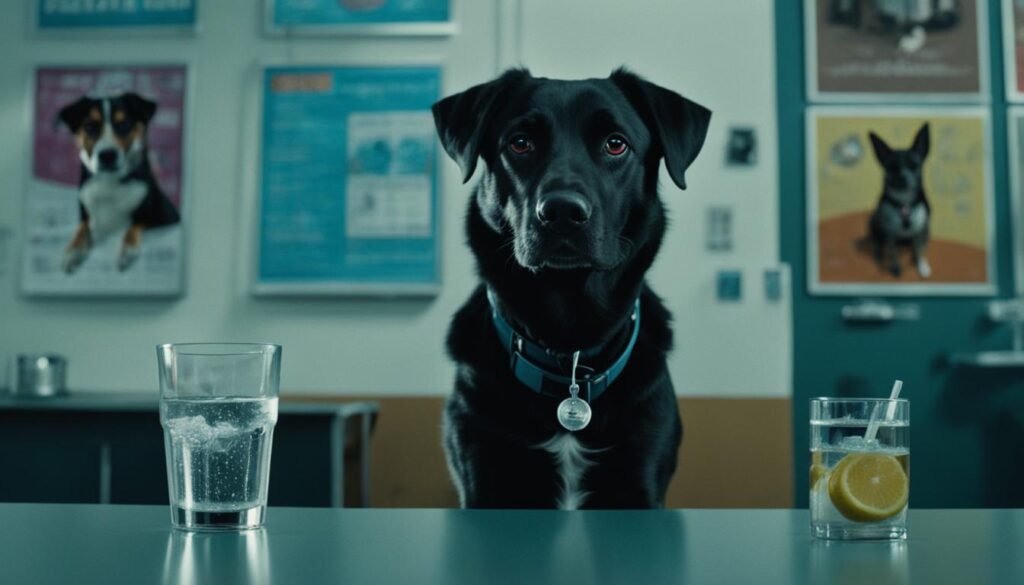
Veterinary professionals generally advise against giving dogs sparkling water. While it may be safe in moderation for some dogs, the carbonation can cause gas and bloating, leading to discomfort. Dogs have different digestive systems than humans and may not tolerate carbonation well. Some sparkling water brands also contain artificial sweeteners or high levels of sodium, which can be harmful to dogs. If you suspect your dog has consumed sparkling water or any potentially harmful substance, contact your veterinarian for advice.
It’s always best to prioritize the health and well-being of your furry friend, and providing them with fresh, plain water is the safest and most beneficial choice. Sparkling water may seem enticing, but when it comes to your dog’s hydration needs, it’s essential to stick to the basics.
While some dogs may tolerate small amounts of unsweetened sparkling water, it’s important to remember that dogs have different dietary requirements and digestive systems than humans. The carbonation in sparkling water can cause discomfort and gas buildup in their digestive system, potentially leading to more serious issues such as bloat.
“Dogs have unique digestive systems designed for processing meat and bones. Carbonation in sparkling water can cause bloating and discomfort in dogs, leading to decreased appetite and digestive upset.” – Diana Laverdure-Dunetz, Canine Nutritionist
Additionally, some sparkling water brands may contain artificial sweeteners or high levels of sodium, which can be harmful to dogs. For example, xylitol, a common sweetener used in sugar-free products, is highly toxic to dogs and can cause low blood sugar and liver disease.
Canine Digestive System vs. Carbonation
Dogs have a unique digestive system designed for processing meat and bones. The carbonation in sparkling water can cause bloating and discomfort in dogs, leading to decreased appetite and digestive upset. The bubbles can also contribute to the risk of bloat, especially in larger breeds.
“The carbonation can cause gas buildup, which may lead to bloat, a potentially life-threatening condition.” – Diana Laverdure-Dunetz, Canine Nutritionist
When it comes to your dog’s health, it’s better to be safe than sorry. Stick to plain, fresh water for your furry friend’s hydration needs and consult with your veterinarian for any specific concerns or questions regarding their diet and overall well-being.
Can Sparkling Water Kill a Dog?
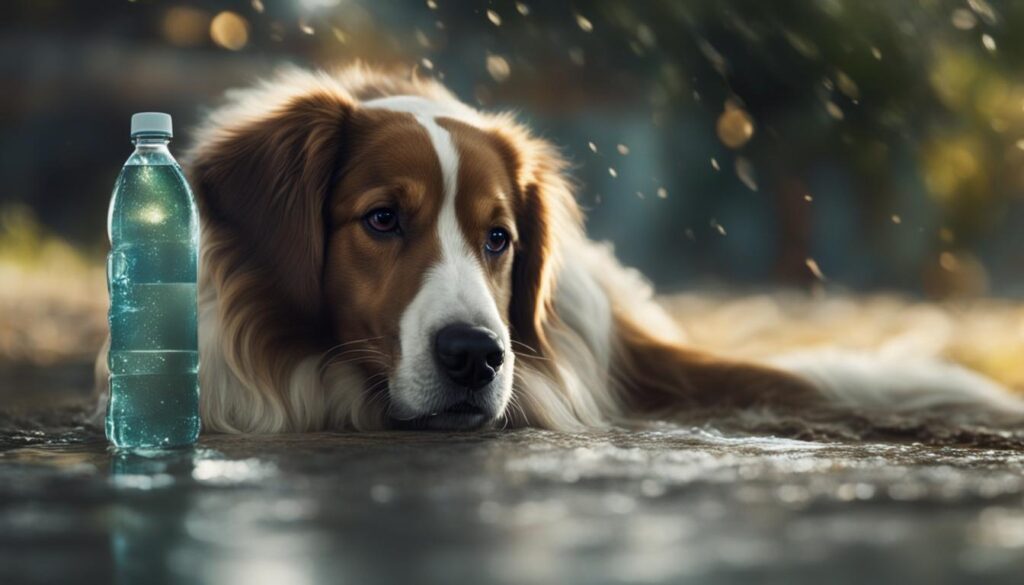
While sparkling water itself is highly unlikely to kill a dog, there are risks associated with giving dogs sparkling water. It is important to understand these risks to ensure the safety and well-being of your furry friend.
The primary concern with sparkling water is the potential presence of harmful ingredients like xylitol. Xylitol is a sweetener commonly found in sugar-free products, including some sparkling water brands. It is highly toxic to dogs and can cause extremely low blood sugar and liver failure, which can be fatal.
Excessive consumption of sparkling water can also lead to bloating in dogs. The carbonation can cause gas buildup and discomfort, increasing the risk of gastric dilation and volvulus (GDV), a life-threatening condition where the stomach twists upon itself. GDV requires immediate veterinary attention and can be fatal if left untreated.
To ensure the safety of your dog, it is best to avoid giving them sparkling water altogether. Instead, provide them with plain, still water for hydration. Plain water is the safest and most natural option for dogs, meeting their hydration needs without any potential risks or harmful ingredients.
Table: Risks of Giving Dogs Sparkling Water
| Risks | Effects |
|---|---|
| Presence of harmful ingredients like xylitol | Extremely low blood sugar, liver failure |
| Excessive consumption | Bloating, gastric dilation and volvulus (GDV) |
It is important to prioritize your dog’s safety and well-being by providing them with the appropriate water options. If you have any concerns about your dog’s hydration or suspect they have consumed sparkling water or any other potentially harmful substance, it is always best to consult with your veterinarian for guidance and advice.
Alternative Hydration Options for Dogs
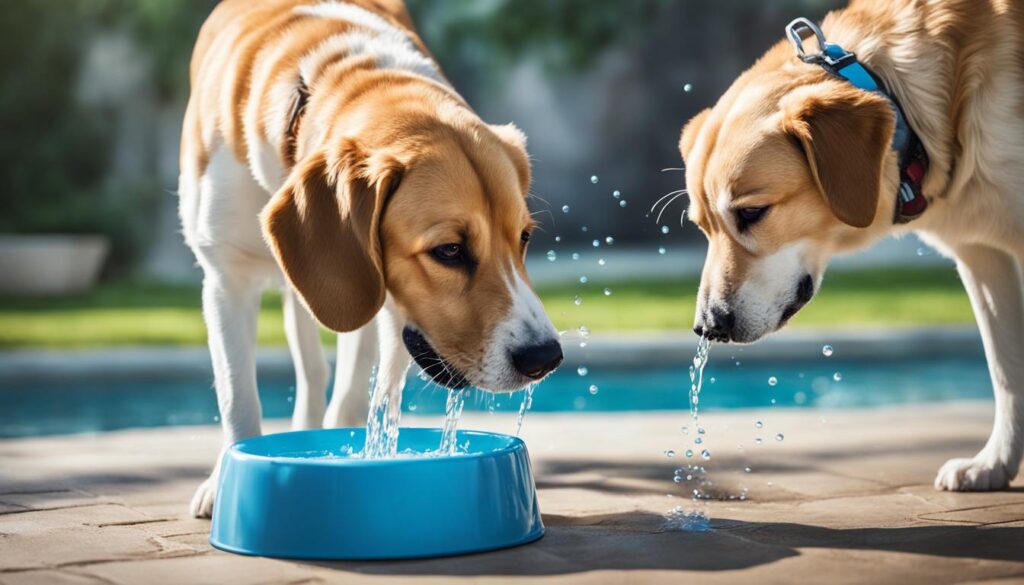
When it comes to keeping our dogs properly hydrated, plain water is always the best option. However, if you’re looking for alternative beverages to offer your furry friend, there are a few safe and beneficial options to consider.
Pedialyte: Pedialyte, a rehydration solution for humans, can be used for dogs as well. It provides electrolytes that can help replenish lost fluids and maintain hydration. However, it’s important to consult with your veterinarian before giving Pedialyte to your dog, as the appropriate dosage may vary depending on their size and condition.
Coconut Water: Another alternative beverage for dogs is coconut water. It is naturally hydrating and contains electrolytes, making it a good option for replenishing fluids. However, it’s crucial to choose plain coconut water without any added sugars or artificial flavors. Additionally, consult with your veterinarian to determine the appropriate amount of coconut water for your dog.
Broth: A warm and comforting option, broth can be a tasty way to keep your dog hydrated. You can use low-sodium chicken or beef broth without any added seasonings or spices. Ensure the broth is cooled before offering it to your dog, and always consult with your veterinarian to ensure it is safe for your furry friend.
By offering these alternative beverages, you can provide electrolytes and additional hydration for your dog while avoiding the potential risks associated with sparkling water. Remember to consult with your veterinarian before introducing any new beverages to your dog’s diet to ensure it is suitable for their specific needs.
The Importance of Hydration for Dogs
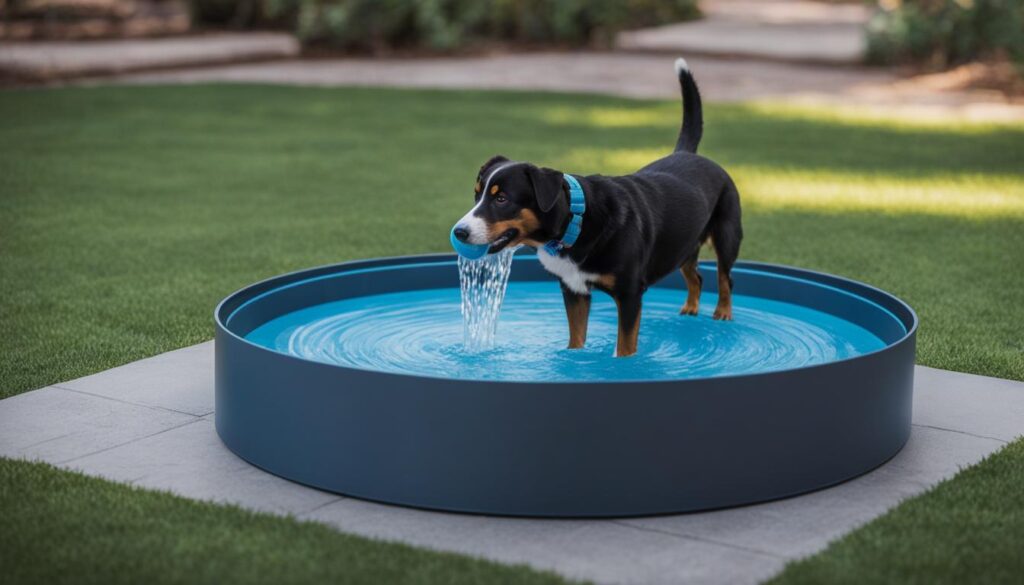
Proper hydration is crucial for the overall health and well-being of dogs. Just like humans, dogs rely on water to maintain their bodily functions and stay hydrated. Here’s why water is essential for your furry friend and how you can ensure they get enough:
The Role of Water in a Dog’s Body
Water plays a vital role in various functions within a dog’s body. It helps regulate body temperature, aids digestion, lubricates joints, transports nutrients, flushes out waste products, and keeps the skin healthy and hydrated. Without adequate water intake, dogs can experience dehydration, which can lead to severe health issues.
How Much Water Should Dogs Drink?
The amount of water a dog needs depends on several factors, including their size, activity level, age, and overall health. The general guideline is to provide about an ounce of water per pound of body weight per day. For example, a 20-pound dog should drink approximately 20 ounces of water daily. However, individual dogs may have different hydration needs, so it’s crucial to monitor their water intake and adjust accordingly.
Water Options for Dogs
When it comes to hydration options for dogs, the best choice is always fresh, clean water. Tap water is generally safe for dogs, but if you prefer to give them bottled water, make sure it doesn’t contain any added minerals or flavors that could be harmful to your furry friend. Avoid giving dogs carbonated or flavored water, as they can cause digestive issues and may contain additives and sweeteners that are toxic to dogs.
Other options to consider for keeping your dog hydrated include:
- Pedialyte: This electrolyte solution can be useful for dogs recovering from illness or experiencing dehydration.
- Coconut water: A natural source of electrolytes, coconut water can provide hydration and essential nutrients for dogs.
- Broth: Low-sodium chicken or beef broth can be a tasty way to increase your dog’s water intake, especially if they are not drinking enough.
Remember to consult with your veterinarian before introducing any new beverages or supplements to your dog’s diet to ensure they are safe and appropriate for your pet.
Monitoring Signs of Dehydration in Dogs
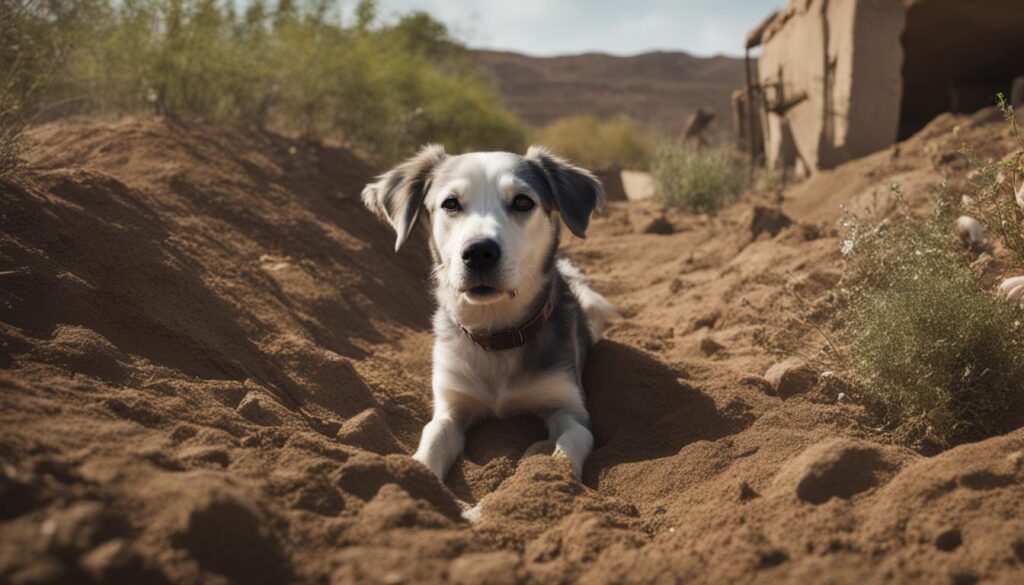
As responsible pet owners, it is crucial to monitor our dogs’ drinking habits and watch for signs of dehydration. A well-hydrated dog is a healthy dog, and dehydration can have serious consequences on their overall well-being.
One of the first signs to look out for is if your dog’s water bowl is consistently full. If you notice that your dog is not drinking enough water or the water level remains the same for extended periods, it may be an indication of dehydration.
In addition to monitoring water intake, there are several other signs of dehydration in dogs to be aware of:
- Dry gums
- Sunken eyes
- Lethargy or lack of energy
- Panting excessively
- Decreased urination
If you observe any unusual changes or signs of dehydration in your dog, it is important to take action. Start by encouraging your dog to drink from their water bowl multiple times throughout the day. Ensure that the water level gradually decreases, indicating that your dog is staying properly hydrated.
If your dog continues to show signs of dehydration or if you have concerns, it is best to consult with your veterinarian. They can provide further guidance and determine the underlying cause of dehydration, if present.
Expert Insight
“Monitoring your dog’s drinking habits and being aware of the signs of dehydration are critical for their health. It is important to remember that dogs rely on proper hydration for various bodily functions.”
Wrapping Up
In conclusion, it is best to avoid giving dogs sparkling water. While some dogs may tolerate small amounts of unsweetened sparkling water, the carbonation can cause gas, bloating, and potentially lead to bloat, a life-threatening condition. Flavored sparkling water should be completely avoided, as it may contain harmful ingredients like xylitol and caffeine. Stick to plain, fresh water for your dog’s hydration needs and consult with your veterinarian if you have any concerns or questions about your dog’s drinking habits.
Frequently Asked Questions
As a responsible dog owner, you want to ensure that your furry friend stays happy and healthy. When it comes to their drinking habits, you may have questions about sparkling water. Let’s address some frequently asked questions about dogs and sparkling water:
Q: Can dogs drink sparkling water?
A: It is not recommended to give dogs sparkling water. The carbonation in sparkling water can cause gas buildup and potentially lead to bloat, a serious and life-threatening condition in dogs.
Q: Is it safe for dogs to drink sparkling water?
A: Sparkling water poses risks to dogs due to the carbonation and potential additives. It is best to stick to plain, fresh water for your dog’s hydration needs.
Q: What are the risks of giving dogs sparkling water?
A: The main risks of giving dogs sparkling water include bloating, gas buildup, and the potential ingestion of harmful additives like xylitol. Carbonation can also disrupt their digestive system.
Q: What alternative beverages are there to giving dogs plain water?
A: If you’re looking for alternative beverages for your dog, consider plain water, Pedialyte (in consultation with your vet), coconut water (without added sugars or artificial flavors), or broth.
Q: What types of water should dogs avoid drinking?
A: Dogs should avoid drinking flavored sparkling water, as it may contain harmful ingredients like xylitol and caffeine. Additionally, they should steer clear of stagnant water, saltwater, and water from pools or other chemically-treated sources.
If you have further questions or concerns about your dog’s hydration, it is always best to consult with your veterinarian for professional advice.
FAQ
Can dogs drink sparkling water?
No, it is not recommended to give dogs sparkling water. The carbonation can cause gas buildup and potentially lead to bloat, a life-threatening condition. It is best to stick to plain, fresh water for your dog’s hydration needs.
Is sparkling water safe for dogs?
No, sparkling water is not safe for dogs. The carbonation can cause discomfort, gas, and bloating. Some sparkling drinks may also contain xylitol, a sweetener that is toxic to dogs. Stick to plain water for your furry friend’s hydration.
What are the risks of giving dogs sparkling water?
The risks of giving dogs sparkling water include gas buildup, bloating, and the potential for developing bloat, a life-threatening condition. Some sparkling drinks may also contain xylitol, which is toxic to dogs and can cause liver disease.
What alternative beverages are there to giving dogs plain water?
Instead of sparkling water, you can consider alternative beverages for your dog such as Pedialyte, coconut water, or broth. These options can provide added hydration without the risks associated with carbonation.
What types of water should dogs avoid drinking?
Dogs should avoid drinking sparkling water, flavored sparkling water, or any beverage that contains additives, artificial sweeteners, or flavors. Stick to plain, fresh water for your dog’s hydration needs.


